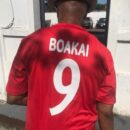North and South Sudan are at war – by Alex de Waal

 Sudan has been described as “˜Africa in microcosm.’ Formerly a single country, political conflict between North and South spawned its ongoing civil war through the second half of the 20th century which eventually culminated in the Comprehensive Peace Agreement (CPA) in 2005, and the secession of South Sudan in 2011.
Sudan has been described as “˜Africa in microcosm.’ Formerly a single country, political conflict between North and South spawned its ongoing civil war through the second half of the 20th century which eventually culminated in the Comprehensive Peace Agreement (CPA) in 2005, and the secession of South Sudan in 2011.
From being a vast, diverse country at war with itself, Sudan has split in to two states, increasingly antagonistic to one another, which face huge challenges associated with the terms on which South Sudan exports oil using the pipeline located in the North, and the continuing political links between each government and political forces inside the territory of the other.
Alex de Waal’s African Arguments Online lecture to the Royal African Society on 17th April 2012 began with the statement that “it all looked so good just over a year ago.” A few days before the referendum on self-determination, the Republic of Sudan’s President, Omar el-Beshir, had visited South Sudan’s capital Juba and promised to welcome and recognise a vote for secession, if this was, “˜the price of peace.’ Indeed, Bashir kept his promise and attended the independence celebrations and was the first to recognize the new state of South Sudan. Today, the two countries are at war, in the border area of Heglig, as well as by proxy in Southern Kordofan and Blue Nile, and increasingly in the borderlands of South Sudan as well.
Alex de Waal is a leading authority on Sudan. As well as being joint editor of this site, he is Director of the World Peace Foundation and has served for several years as an adviser to the African Union’s High Level Implementation Panel for Sudan. His explanation is complex.
The roots of the current crisis stem from several factors:
- The respective leaderships of North and South Sudan are not sufficiently strong with respect to special interests within their ruling parties and military establishments, to be able to enforce compromise positions.
- Issues deferred during the CPA remain unresolved – these included the status of SPLA soldiers in Southern Kordofan and Blue Nile States.
- The parties have not agreed on the common borderline. The delineation of the agreed border, as it stood on 1 January 1956, is not the problem. Rather it is the status of the five disputed areas, and whether the South is permitted to make additional claims to territory beyond those that were agreed during the CPA period.
- The shutdown of oil production in South Sudan in January created a situation in which there is an objective deadline for the resolution of key issues, before the South uses up its cash reserves.
Of the estimated 150–200,000 SPLA soldiers on the books in 2011, approximately 40,000 came from the North Sudanese states of Southern Kordofan and Blue Nile. These men fought for their own agenda related to the transformation of the political system within the whole of Sudan, rather than the parallel aim of independence for the South. The CPA defined the SPLA as the army of South Sudan and did not resolve the question of the status and future of those soldiers who originated from North Sudan.
Many inhabitants of Southern Kordofan and Blue Nile (including SPLA members) worried that, following secession of the South, they would become a “small, desperate and vulnerable population in the North.” During negotiations for post-secession Sudan, advisors (including de Waal) lobbied for stronger security provisions to be made for the populations of Southern Kordofan and Blue Nile states – including a proposal for a “Joint Command Mechanism” that would allow for the integration of these troops into the northern security establishment. However, what resulted was an agreement where all SPLA troops would be withdrawn South after independence. De Waal called this “a recipe for war” as “these people would not be prepared to go.”
After several postponements, the Government of Sudan demanded the withdrawal of the SPLA to the South on 1 June 2011. The fighting started in Southern Kordofan on 6 June. A week later, negotiations began in Addis Ababa to resolve this conflict. This resulted in a Framework Agreement signed on 28 June. Unfortunately it was repudiated by the North Sudan leadership. De Waal states that this was Beshir’s biggest mistake thus far. As the conflicts in Southern Kordofan and Blue Nile intensified, South Sudan was compelled to become involved due to its essential solidarity with the SPLA soldiers in Southern Kordofan and Blue Nile, who continue to fight under the insignia of South Sudan.
The Border
As part of the CPA it was agreed that the North-South border would be delineated according to its position at independence in 1956. Whilst de Waal described the border committee as being “remarkably dysfunctional,” it eventually came up with a report that identified 4 disputed areas: Kafia Kingi, Abyei, Kaka and Jodha. A fifth area, Bahr al Arab, was added for political reasons. Crucially, related to events in the past weeks, Heglig – a region in to which SPLA troops have recently moved – was not in dispute. The 1956 border clearly shows Heglig to be within North Sudan. However, South Sudanese make a claim to the area based on traditional tribal land ownership. In addition, Heglig is significant because it is the main oil producing area in North Sudan.
In response to the South Sudanese occupation of Heglig, the U.S. government stated that this action went “…beyond self defence.” The African Union and United Nations have shown unprecedented unanimity in calling for unconditional withdrawal. As these statements suggest, the South’s territorial claim for Heglig has reduced international sympathy for its current situation. As de Waal stated, occupation of an area of another state “is not considered good international practice.” He predicts that with the U.S. is losing patience with South Sudan and is likely to take fewer pro-South positions.
In recent weeks, the SPLA has also been getting the better of the fighting. Whilst the conflict has largely been “˜conventional’ in nature – fought through bombing, tanks and regular troops – the fear is that this may develop in to a militia war, and in Sudan’s conflicts (notably in Darfur) militia have generally committed the worst crimes.
Economic Factors
Pre-secession oil revenues for North Sudan constituted 55 percent of its national budget. North Sudan has experienced a 40 percent drop in oil revenues since secession, a decrease in budget which would require mitigation either by austerity, international assistance or transitional financial assistance from the South. None of these three has taken place. In December, as a result of the dire economic situation in the North, the Khartoum government started taking oil that rightly belonged to the South. This prompted the South’s oil shutdown – de Waal states that the South “didn’t really do their sums” with regard to the financial implications of this this decision. At some point, in the near future, the South Sudanese government will simply run out of money. If the government has no money then quite rapidly the South may become ungovernable.
Solutions
De Waal detailed a number of changes that would need to occur in order to return the 2 sides to peace. These included the unconditional withdrawal of South Sudanese troops from Heglig, an end to aerial bombardment, an end to support from both sides for armed proxies operating internally in the other’s conflicts, an international monitoring force to be deployed on the border (a United Nations-supported Joint Border Verification and Monitoring Mission, with the Ethiopian troops of the UN Interim Security Force in Abyei providing force protection and logistics) the settling of the Abyei issue and an agreement on oil.
Magnus Taylor is Managing Editor of African Arguments Online.







This renewed conflict might be “beneficial” for both parties to shift internal focus from the rampant corruption, bad governance and economic difficulties to the outside enemy and attempt to unify the internal front. People in the afflicted areas suffer the worst, least of which is displacement. I think the AU and UN should have the interest of these people in mind before anything else.
I also suspect that South Sudan didn’t turn off the oil wells on their own initiative. The US and other powers may have encouraged this move to again punish the North instead of the promised rewards for completing the CPA successfully. It’s very much consistent with the on-going US sanctions.
[…] Director of the World Peace Foundation, Alex de Waal, spelled it out brilliantly in a lecture to the Royal African Society in London as a simple two-step process which is laughingly […]
What/why the place and essential significance of Sudan?–which to be certain, Sudan has attracted inordinate level of external attraction beyond the confines of its own borders–Why? Is it the absolute brutality of its internal conflicts which generated an international moral outrage of attention demanding external intervention–or possibly the discovery of oil and the potential of immense oil reserves which attracted the international energy markets—or the fear by certain actors who are becoming alarmed by the Sudanese government’s support in allowing the country [Sudan] to be used as a base of operations in advancing Islamic revolutionary extremism to be exported abroad to create social and civil unrest while ensuring that Sudan will be a safe haven in order to ensure further incursions leading to civil and social unrest. All this in one country poorly served by the political and legislative elite.
Sudan and South Sudan is a region fractured and must be attended in terms of civic civil social cohesive assistance which must be led and directed by the Sudanese.
Monte McMurchy
McMurchy,
I think there’s some truth to a yes answer to all of your questions. I have a theory on the “disproportionate” attention given to Sudan. The prolonged war in the south and its’ severity in terms of human cost, and the formation of a regional and western consensus to end it. That was there all along. And then there was the gravity of the atrocities in Darfur was captured by the Save Darfur Movement (and according to some exaggerated). Anyways, my theory basically is that after Sarajevo, Kosovo, Rwanda the collective international opinion became extremely responsive to large scale atrocities. the Sudanese govt unable to understand the changes in world opinion and sentiments, they miscalculated the consequences.
I’m not so optimistic when I look at the leadership (both govt and opposition) in both countries. Maybe it’s time for a popular uprising!
The Only Solution is demarcating the border to reflect 1/1/56. It is absurd as it is to call North and South sovereign States with ambiguous borders.
[…] [1] Alex De Waal interview with Magnus Taylor. “Currently, Its War for North and South Sudan,†African Arguments. April 24, 2012. https://africanarguments.org/2012/04/24/alex-de-waal-currently-it%E2%80%99s-war-for-north-and-south-sudan/ […]
[…] [1] Alex De Waal interview with Magnus Taylor. “Currently, Its War for North and South Sudan,â€Â African Arguments. April 24, 2012.https://africanarguments.org/2012/04/24/alex-de-waal-currently-it%E2%80%99s-war-for-north-and-south-sudan/ […]
[…] involved following greater intensification of the war and due to what leading expert on Sudan, Alex De Waal states was an ‘essential solidarity with the SPLA soldiers in Southern Kordofan and Blue […]
[…] Hier ein sehr ausführlicher Artikel (auf Englisch) über die Hintergründe des Sudankonfliges von Alex de Waal, einem der international bekanntesten Sudan- Experten […]